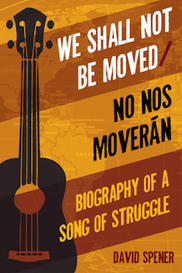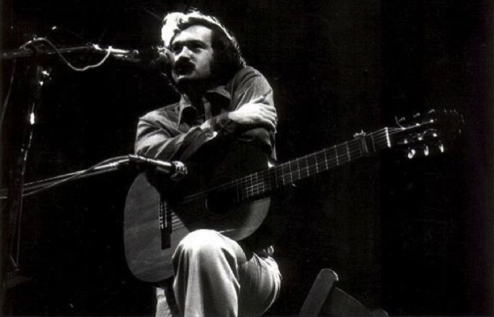Chapter 6. Across the Atlantic to Spain
Scroll down for audio, video, images and information to supplement your reading of Chapter 6 of We Shall Not Be Moved/No nos moverán: Biography of a Song of Struggle.
Visiting Spain in 1977, Joan Baez dedicated her performance of “No nos moverán” to Dolores Ibárruri--La Pasionaria--on the popular television program Esta Noche, Fiesta.
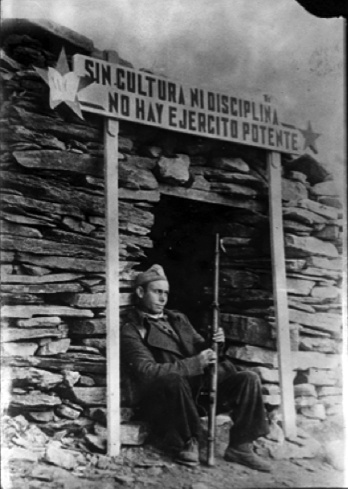
One of the many thousands of international volunteers who fought to defend the Spanish Republic against fascist forces led by General Francisco Franco.
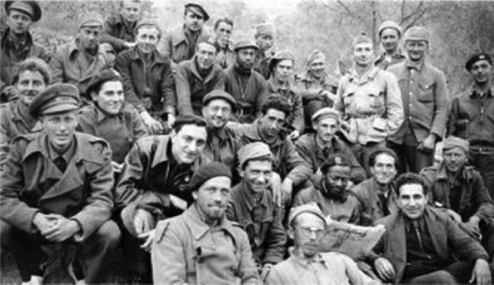
International brigadistas in Spain.
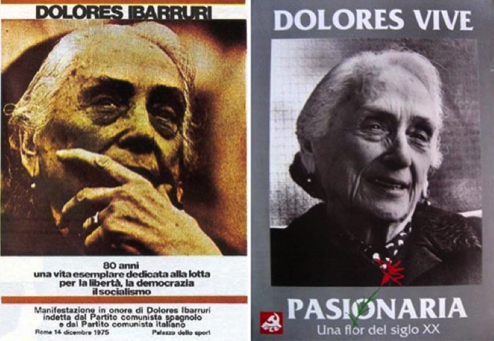
Dolores Ibárruri, famous for her cry of “¡No pasarán!” [They will not pass!] in her impassioned speech to Republican loyalists during the siege of Madrid in 1937.
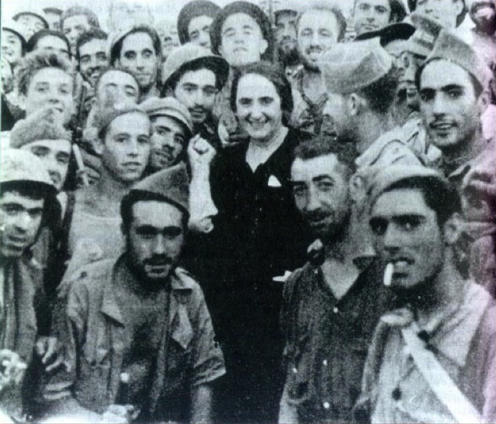
Ibárruri with Republican troops during the war.
Republican loyalists during the defense of Madrid. Ibárruri’s cry was turned into a Republican anthem by German composer Hans Eisler. The song “No pasarán” is sometimes confused with “No nos moverán,” especially with regard to the Spanish Civil War. The author found no evidence suggesting that the latter song was sung in Spanish in Spain until the 1960s.
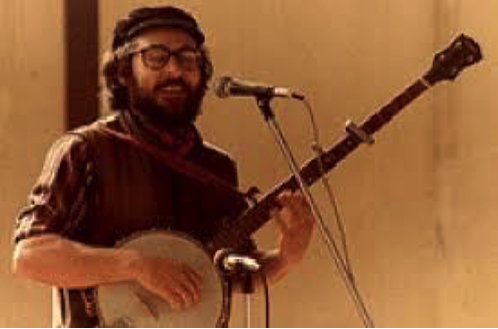
As a high school student in the early 1960s, Barcelona native Xesco Boix participated in an exchange program in which he lived and studied in Los Angeles, California for a year. He became a fan of U.S. folk protest music, learning to sing in English and play the banjo in the style of Pete Seeger. He returned to Barcelona to attend college and adapted “We Shall Not Be Moved” to his native Catalan as “No serem moguts” to sing in the student protests against the Franco dictatorship.
Xesco Boix performs "No Serem Moguts"
Joan Baez’ performs “No Serem Moguts” in concert in Barcelona.
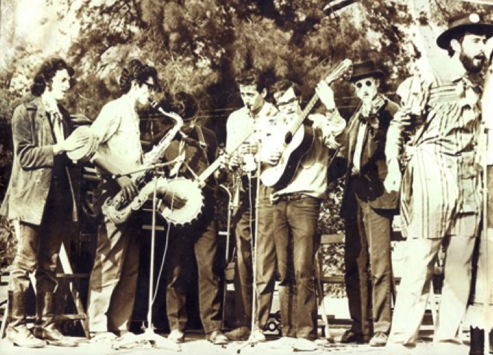
With a number of other young musicians and singers, Boix founded the Grup de Folk in Barcelona, which included “No serem moguts” and other adaptations of U.S. folk songs in its repertoire. He went on to a successful career in post-Franco Spain as a folk musician and performer of children’s songs in Catalan. He committed suicide in 1984.
Photograph of the Catalonian musical duo, La Bicicleta. Xesco Boix's biographer and fellow banjo player, Luis Panyella, is the male half of the duo.

A childhood friend of Xesco Boix, Ignacio Fernández Toca, visited Boix in 1967 in Barcelona. Fernández Toca attended college at the Universidad Complutense de Madrid, where he participated in a songwriters’ collective known as Canción del Pueblo [Song of the People]. Boix taught Fernández Toca “No serem moguts” on that visit and together they translated it to Castilian Spanish. The members of Canción del Pueblo recorded a number of makeshift singles on their own label, including Fernández Toca’s Castilian version of “No nos moverán.” It was probably this recording that made its way into the hands of the members of the Chilean band Tiemponuevo in the port city of Valparaíso, where a small community of Spanish Republican refugees had formed.
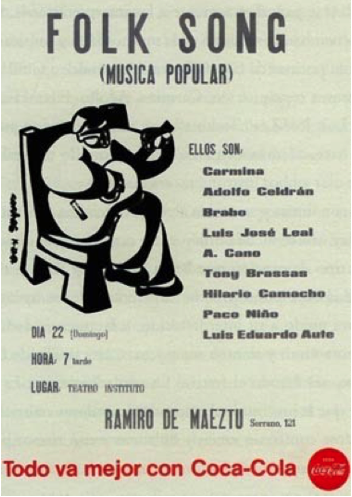
The members of the Canción del Pueblo collective made their first public performance in 1967 in the theater of the Instituto Ramiro de Maetzu in Madrid. The influence of U.S. protest music was evident in the title they gave to their recital—Folk Song.
Adolfo Celdrán was one of the members of the Canción del Pueblo collective that went on to a professional musical career. “No nos moverán” became a staple song in his repertoire. Learn more about Celdrán’s singing career by clicking on the photo.

Following the death of Franco, Adolfo Celdrán recorded Denegado, a long-play album of songs that had been censored during the fascist dictatorship. The album opened with his version of “No nos moverán.”
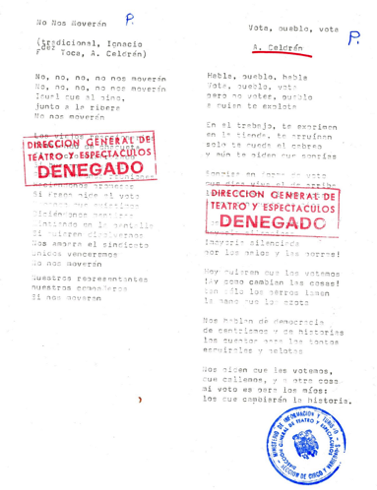
Celdrán saved documents he received from Franco’s censors. This one indicates that he was prohibited from recording and performing “No nos moverán.”
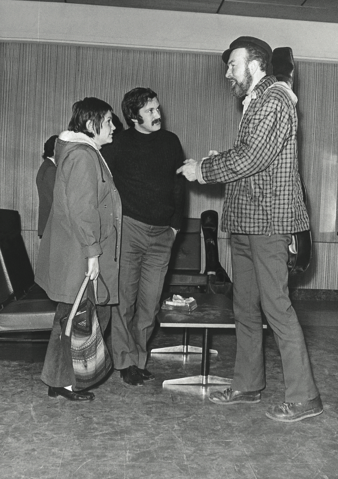
Adolfo Celdrán and Elisa Serna, former members of the Canción del Pueblo collective, meeting Pete Seeger on the U.S. folk singer’s visit to Spain in 1971.
“No nos moverán” continues to be sung at soccer matches in Spain today.
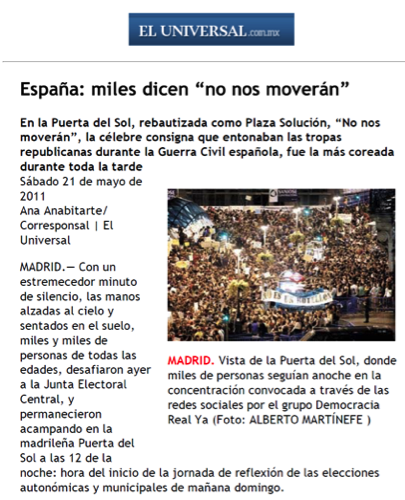
The “indignados” [indignant ones] protesting austerity policies in 2011 in Madrid’s Puerta del Sol, the city’s central plaza, sang “No nos moverán” as a defiant gesture of repudiation of the government. Note the author of this article’s confusion concerning the song’s history. She confuses it with “No pasarán” fron the Spanish Civil War.

Protest songs for the May 15 movement of the “indignados” recorded by an anonymous group. The group's album could be downloaded from amazon.com.
In 2011, a workers’ choir in Madison, Wisconsin filmed themselves singing “No nos moverán” on the steps of the state capitol as a demonstration of their solidarity with the “indignados” in Spain.
Ysaye Barnwell, formerly of Sweet Honey in the Rock, singing “We Shall Not Be Moved” as part of the Occupy Wall Street demonstrations in 2011 in New York City.
An episode of the Spanish television series Verano Azul featured "No nos moverán" being sung by the cast.
Manchester United fans chanting/singing "We Shall Not Be Moved"
